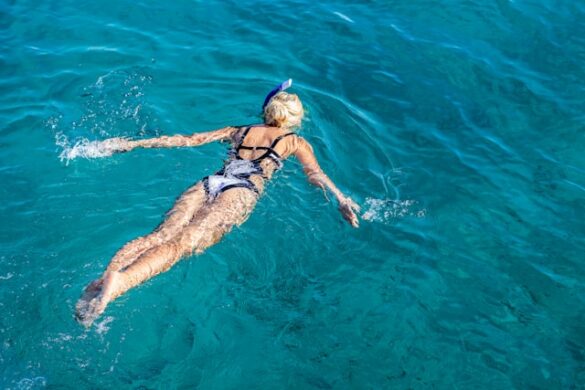‘’Thalassophile’’ – Someone who loves the sea.
Originating from the Greek words Thalassa, meaning “sea,” and Phil, meaning “love,” a thalassophile is a person who loves the sea. This blog post will dive into eco-conscious snorkeling, diving, and exploring the ocean respectfully.
Drawn to the ocean
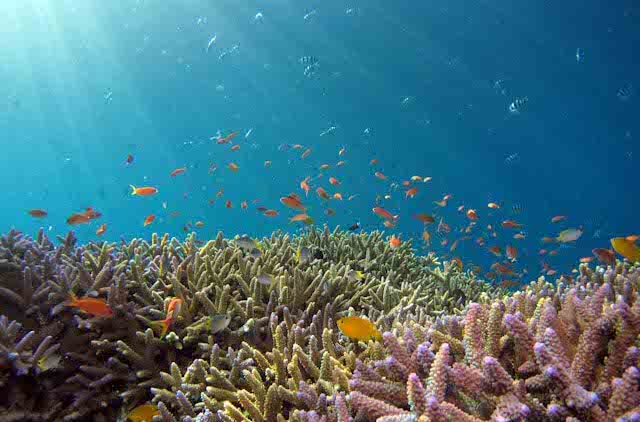
For many people, one of the most exciting parts of the earth is the beautiful world of the ocean.
When we go snorkeling and diving, we can capture some of the unparalleled beauty of underwater ecosystems. No wonder many people share a strong passion for snorkeling and diving and love to explore the ocean. There’s something magical and extraordinary about exploring the environments beneath the surface – the vibrancy, diversity, and depth of the deep.
The ocean is tinged with vastness and limitlessness, forcing us to question our place in the world. The limitlessness of the ocean can help us change our perspective and think less about ourselves and more about our community.
The earth is covered by 71 percent ocean water, and the sea contains sodium chloride and many other minerals necessary for survival. It makes sense that humans would feel at home in, on, and near the water. The ocean also offers a strong sense of tranquility and balance that can assist with both depression and anxiety. Simply looking at the ocean can activate opiate receptors in the brain and release dopamine.
Risks of snorkeling and diving
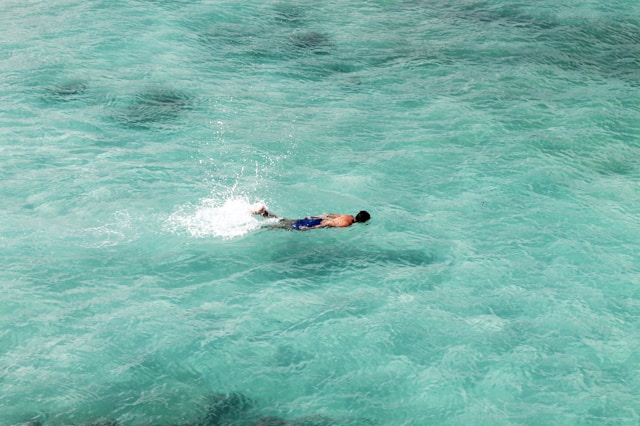
Snorkeling and diving allow us to experience the ocean’s beauty and mystery. However, exploring the sea poses several risks for humans and the ocean ecosystems. Diving is something that humans need to prepare for and perform carefully.
Snorkeling and especially diving can be dangerous for humans, and it is essential to be aware of the challenges of underwater diving. Diving can pose risks like decompression sickness, barotrauma, nitrogen narcosis, oxygen toxicity, encounters with dangerous marine life, and equipment malfunctions, highlighting the need for proper training and safety measures.
Potential harm to the ocean by snorkeling and diving
Engaging with the ocean through snorkeling and diving also poses critical risks for the ocean and its ecosystems. The potential harm to the ocean caused by snorkeling and diving includes:
- Damage to coral reefs: Improper techniques, accidental contact, or irresponsible behavior can harm coral reefs. This can lead to degradation and destruction of corals. Coral reefs are vital marine ecosystems that support a wide array of marine life.
- Disturbing marine life: Snorkelers and divers can unintentionally disrupt marine life by getting too close to or touching marine creatures, leading to animal stress or injury. This disturbance can disrupt their natural behavior and impact the overall ecosystem.
- Physical damage to underwater environments: Careless handling of equipment or lack of awareness about the fragility of the aquatic environment can lead to unintentional physical damage to the sea floor, marine vegetation, and other delicate underwater structures.
- Pollution: Divers and snorkelers may accidentally introduce pollutants into the marine environment, such as sunscreen, debris, or other waste materials. These pollutants can have adverse effects on marine life and their habitats.
- Souvenir collection: Some snorkelers and divers might be tempted to collect marine life or souvenirs from the sea, removing essential ecosystem components and disrupting the balance of the underwater environment.
How to be eco-conscious when snorkeling and diving
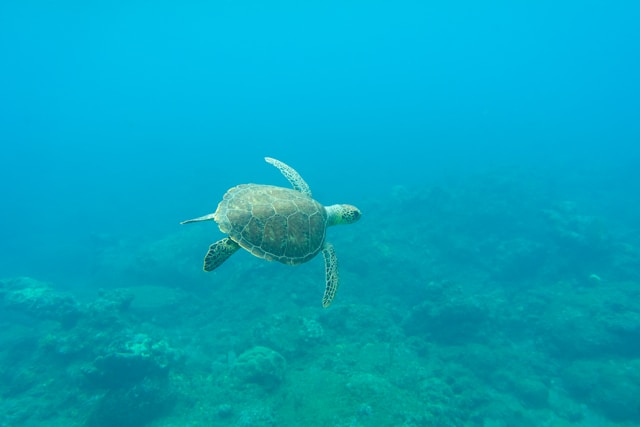
Snorkelers and divers must snorkel and dive with respect for the ocean, be aware, train properly, and take safety measures before and during snorkeling and diving.
Proper training is especially crucial to mitigate risks to the ocean ecosystem as much as possible. Likewise, it is essential to follow all guidelines set by marine conservation organizations. Raising awareness about conservation and preserving underwater ecosystems also helps spread the message and knowledge about why responsible diving and snorkeling practices are vital.
How to be a responsible snorkeler or diver when exploring the ocean
- Respect Marine Life: Avoid touching, disturbing, or removing any marine life, and maintain a safe distance to protect the delicate underwater ecosystem.
- Use Eco-Friendly Sunscreen: Choose a sunscreen labeled reef-safe and free from harmful chemicals to prevent coral bleaching and minimize the impact on marine life.
- Practice Buoyancy Control: Refine your buoyancy skills to avoid contact with the seabed and coral reefs, minimizing physical damage and disturbance to the underwater environment.
- Respect Local Regulations: Follow all diving and snorkeling regulations set by local authorities and marine conservation organizations to ensure the preservation of fragile ecosystems and wildlife.
- No Waste: Avoid leaving any waste behind while diving or snorkeling, and consider participating in clean-ups both on land and underwater clean-up activities to help maintain the ocean’s cleanliness.
- Support Responsible Operators: Research and choose diving and snorkeling operators who prioritize environmental conservation and responsible diving practices.
- Educate Yourself: Stay informed about the local marine environment and how to be responsible when snorkeling or diving. Share your knowledge with others to promote awareness and understanding of marine conservation.
- Reduce Plastic Use: Properly dispose of any plastic items you use during your diving or snorkeling trips, and opt for reusable and sustainable alternatives to single-use plastics.
- Contribute to Conservation Efforts: Volunteer or donate to local marine conservation organizations and participate in efforts to protect and restore marine habitats and ecosystems. For example, divers can engage in coral restoration projects to actively contribute to biodiversity conservation. Many coral restoration projects have successfully restored coral populations and enhanced reefs’ overall health.
By incorporating these practices into your snorkeling and diving activities, you help take care of the ocean environment and ecosystem, helping to preserve the ocean’s beauty and biodiversity instead of harming it.
Eco-conscious snorkeling and diving destinations
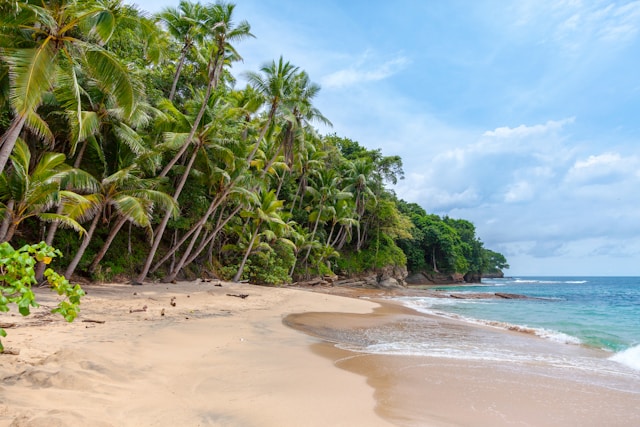
If you’re ready for your next snorkeling or diving adventure, here is a list of great destinations. These destinations are also known for taking steps to protect marine ecosystems.
Seychelles, East Africa
The Seychelles, situated in the Indian Ocean off East Africa’s coast, offer some of the world’s best diving. Comprising 115 islands across 1100 km, this archipelago features untouched coral reefs, crystal-clear waters, and uncrowded white sand beaches. With half the country preserved as national parks, the Seychelles are rich in marine life.
Explore hotels in Seychelles!
Hawaii, United States
Hawaii is the perfect place for both beginner and more experienced divers. Explore intriguing shipwrecks and find many different caverns and rock formations. Encounter a diverse array of marine life, including lobsters, angelfish, turtles, various shark species, and unique regional species.
Explore hotels in Hawaii!
Cozumel, Mexico
The marine life of the Yucatan Peninsula is breathtaking and vibrant. Cozumel stands out as one of the Caribbean’s premier diving spots, boasting an abundance of colored fish, turtles, nurse sharks, and various ray species inhabiting its reefs. On the mainland, explore diverse ancient cenotes, including cenote caves, open cylinder cenotes, and fully open cenotes, where freshwater fish abound.
Explore hotels in Cozumel!
Fiji Islands, Fiji
Fiji is widely recognized as the Soft Coral Capital of the World, boasting 80 diverse soft coral species that attract divers globally. The surrounding waters host over 330 hard coral species, representing 42% of all known coral species worldwide. Fiji’s reefs showcase a vibrant array of colors and remarkable underwater landscapes.
Explore Hotels in Fiji!
Lombok, Indonesia
Lombok is a peaceful and nature-filled paradise with beautiful white beaches and clear waters. While it’s famous for great surfing, the island also has volcanoes and vibrant reefs. The waters are full of diverse fish, making Lombok a well-known spot. You can encounter trevallies, turtles, eels, and colorful parrotfish.
Explore Hotels in Lombok!
Great Barrier Reef, Australia
This coral reef system is the largest globally and is visible from space. The variety of marine life here is incredible, with divers encountering 1500 fish types and hundreds of coral species! Diving is spectacular all year round; however, different seasons bring in different migrating marine life and various reef activities.
Explore hotels in the Great Barrier Reef!
Bonaire, Caribbean
Bonaire is a paradise for divers and a famous destination. Located in the southern Caribbean, on the coast of Venezuela, this paradise was voted the number one shore diving destination in the Caribbean. It’s considered a great and unique place for diving because of the abundant coral reef only a few feet from shore.
Explore hotels in Bonaire!
Thank you for reading!
Remember, being a responsible traveler involves choosing responsible operators, supporting local communities, and minimizing your environmental impact wherever you travel. Always research and prioritize destinations that prioritize conservation.
Don’t forget to check out our blog for more content on sustainability, travel, and more! Click here to visit now.
